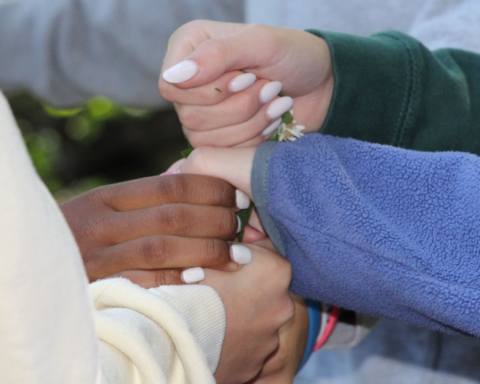The essay below ran recently on a page Park sponsored in The Bay State Banner. We are grateful to Lesley Ryan Miller and Tiffany Hogan for their participation.
The leaders of the two boards that guide The Park School, the Board of Trustees and the Parents’ Association (PA) Executive Board, have a lot in common: they are both Dorchester residents who love their community, Black mothers who want the best for their children, and great believers in what The Park School experience means to their family.
When Lesley Ryan Miller, Park’s new Board Chair, and her husband, Harold, considered schools for their daughter, they prioritized academic excellence — schools that challenge students to meet their potential — as well as a setting in which their daughter would know that she was valued. At The Park School Open House, she met up with Tiffany Hogan, already a friend from Dorchester, and was thrilled to learn that there was already a strong contingent of Dorchester, Roxbury, and Mattapan families at Park.
Born and raised in Dorchester, Park PA President Tiffany Hogan attended Boston Latin Academy, and credits education with opening up opportunities for her. She wanted a school that would challenge her son, and provide him with a world-expanding network. Though worried that public school options did not reflect her family’s values, Tiffany didn’t want to trade the Dorchester community she loved for a less diverse one, nor send her child a long distance on a bus. Further, it was important to Tiffany that she could be known and involved in her son’s school, something that wouldn’t be possible if he commuted out to a suburban school.
At a school information session, Tiffany met Park School psychologist Dr. Olivia Moorehead-Slaughter, who highlighted the importance of having “mirrors and windows” in the school experience. Mirrors: people who look like you and who share your life experience. Windows: people whose different life experience and background help you see the world more broadly. Keeping this in mind, Tiffany chose Park. “Park is fairly close” to Dorchester, she thought, “and other good friends’ children attended. Coming to Park allows us to bring where we live together with the school community.”
The people Tiffany met at Park were down to earth and warm. She says, “At Park, everyone just wants the best for their family. They want their children to grow as happy, wholesome, well-rounded students with access to every opportunity.” Her son will graduate this spring, and she knows that his Park experience has been transformational. Her son started out shy and reserved and is now a confident, thoughtful leader who advocates for himself and for others. “The whole community — teachers, administrators, other students, their families — has lifted him up, and helped him grow into a good human being.”
For Lesley, whose daughter is now in Grade 6, a true highlight of the Park experience has been the programming, with the combination of smaller class size and extensive offerings in academics, athletics, performing arts, and visual arts. Her daughter loves being able to engage in all of these. The reality of the Park experience absolutely lived up to its promise — “Park made good” on all it professed to offer.
This experience is, in large part, what inspired Lesley and Harold to want to give back to the community with their own leadership, serving together as co-chairs of Park’s current capital fundraising campaign. “We believe in the Park model,” she says, and they believe in helping ensure that Park can continue expanding access to students and families through student-centered learning, extra curricular activities, and financial aid resources.
Accepting appointment as Park’s first Black board chair, Lesley knew it was an opportunity to bring the perspectives of people of color to the leadership role. It was also important, she notes, for her daughter and others to see a Black woman in this leadership position, expanding their idea of what “leadership” looks like at Park, and potentially challenging assumptions of those who may not think they would belong at Park. Similarly, when considering the invitation to serve as PA president, Tiffany welcomed the opportunity to continue broadening Park’s understanding of the needs and priorities of the diverse community that comes to Park.
When her family first considered Park, Lesley recalls wondering, “Would it feel like home? Will we feel like visitors?” Both Tiffany and Lesley agree that Park is a place where all members of the community are heard, seen, and appreciated. They know with confidence that Park is “home.”






